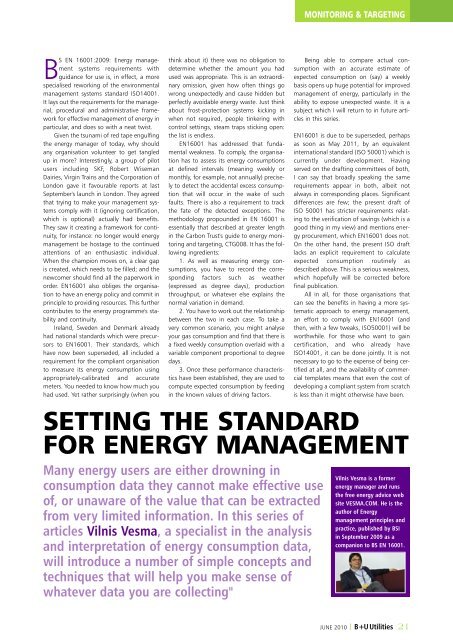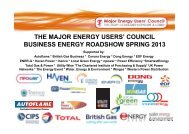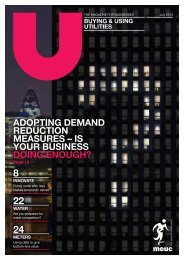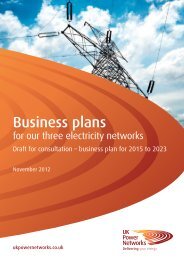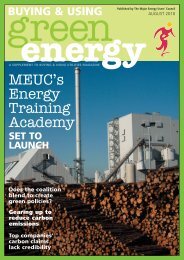CRC - MEUC
CRC - MEUC
CRC - MEUC
You also want an ePaper? Increase the reach of your titles
YUMPU automatically turns print PDFs into web optimized ePapers that Google loves.
BS EN 16001:2009: Energy management<br />
systems requirements with<br />
guidance for use is, in effect, a more<br />
specialised reworking of the environmental<br />
management systems standard ISO14001.<br />
It lays out the requirements for the managerial,<br />
procedural and administrative framework<br />
for effective management of energy in<br />
particular, and does so with a neat twist.<br />
Given the tsunami of red tape engulfing<br />
the energy manager of today, why should<br />
any organisation volunteer to get tangled<br />
up in more? Interestingly, a group of pilot<br />
users including SKF, Robert Wiseman<br />
Dairies, Virgin Trains and the Corporation of<br />
London gave it favourable reports at last<br />
September's launch in London. They agreed<br />
that trying to make your management systems<br />
comply with it (ignoring certification,<br />
which is optional) actually had benefits.<br />
They saw it creating a framework for continuity,<br />
for instance: no longer would energy<br />
management be hostage to the continued<br />
attentions of an enthusiastic individual.<br />
When the champion moves on, a clear gap<br />
is created, which needs to be filled; and the<br />
newcomer should find all the paperwork in<br />
order. EN16001 also obliges the organisation<br />
to have an energy policy and commit in<br />
principle to providing resources. This further<br />
contributes to the energy programme's stability<br />
and continuity.<br />
Ireland, Sweden and Denmark already<br />
had national standards which were precursors<br />
to EN16001. Their standards, which<br />
have now been superseded, all included a<br />
requirement for the compliant organisation<br />
to measure its energy consumption using<br />
appropriately-calibrated and accurate<br />
meters. You needed to know how much you<br />
had used. Yet rather surprisingly (when you<br />
think about it) there was no obligation to<br />
determine whether the amount you had<br />
used was appropriate. This is an extraordinary<br />
omission, given how often things go<br />
wrong unexpectedly and cause hidden but<br />
perfectly avoidable energy waste. Just think<br />
about frost-protection systems kicking in<br />
when not required, people tinkering with<br />
control settings, steam traps sticking open:<br />
the list is endless.<br />
EN16001 has addressed that fundamental<br />
weakness. To comply, the organisation<br />
has to assess its energy consumptions<br />
at defined intervals (meaning weekly or<br />
monthly, for example, not annually) precisely<br />
to detect the accidental excess consumption<br />
that will occur in the wake of such<br />
faults. There is also a requirement to track<br />
the fate of the detected exceptions. The<br />
methodology propounded in EN 16001 is<br />
essentially that described at greater length<br />
in the Carbon Trust's guide to energy monitoring<br />
and targeting, CTG008. It has the following<br />
ingredients:<br />
1. As well as measuring energy consumptions,<br />
you have to record the corresponding<br />
factors such as weather<br />
(expressed as degree days), production<br />
throughput, or whatever else explains the<br />
normal variation in demand.<br />
2. You have to work out the relationship<br />
between the two in each case. To take a<br />
very common scenario, you might analyse<br />
your gas consumption and find that there is<br />
a fixed weekly consumption overlaid with a<br />
variable component proportional to degree<br />
days.<br />
3. Once these performance characteristics<br />
have been established, they are used to<br />
compute expected consumption by feeding<br />
in the known values of driving factors.<br />
MONITORING & TARGETING<br />
Being able to compare actual consumption<br />
with an accurate estimate of<br />
expected consumption on (say) a weekly<br />
basis opens up huge potential for improved<br />
management of energy, particularly in the<br />
ability to expose unexpected waste. It is a<br />
subject which I will return to in future articles<br />
in this series.<br />
EN16001 is due to be superseded, perhaps<br />
as soon as May 2011, by an equivalent<br />
international standard (ISO 50001) which is<br />
currently under development. Having<br />
served on the drafting committees of both,<br />
I can say that broadly speaking the same<br />
requirements appear in both, albeit not<br />
always in corresponding places. Significant<br />
differences are few; the present draft of<br />
ISO 50001 has stricter requirements relating<br />
to the verification of savings (which is a<br />
good thing in my view) and mentions energy<br />
procurement, which EN16001 does not.<br />
On the other hand, the present ISO draft<br />
lacks an explicit requirement to calculate<br />
expected consumption routinely as<br />
described above. This is a serious weakness,<br />
which hopefully will be corrected before<br />
final publication.<br />
All in all, for those organisations that<br />
can see the benefits in having a more systematic<br />
approach to energy management,<br />
an effort to comply with EN16001 (and<br />
then, with a few tweaks, ISO50001) will be<br />
worthwhile. For those who want to gain<br />
certification, and who already have<br />
ISO14001, it can be done jointly. It is not<br />
necessary to go to the expense of being certified<br />
at all, and the availability of commercial<br />
templates means that even the cost of<br />
developing a compliant system from scratch<br />
is less than it might otherwise have been.<br />
SETTING THE STANDARD<br />
FOR ENERGY MANAGEMENT<br />
Many energy users are either drowning in<br />
consumption data they cannot make effective use<br />
of, or unaware of the value that can be extracted<br />
from very limited information. In this series of<br />
articles Vilnis Vesma, a specialist in the analysis<br />
and interpretation of energy consumption data,<br />
will introduce a number of simple concepts and<br />
techniques that will help you make sense of<br />
whatever data you are collecting"<br />
Vilnis Vesma is a former<br />
energy manager and runs<br />
the free energy advice web<br />
site VESMA.COM. He is the<br />
author of Energy<br />
management principles and<br />
practice, published by BSI<br />
in September 2009 as a<br />
companion to BS EN 16001.<br />
JUNE 2010 | B+U Utilities 21


